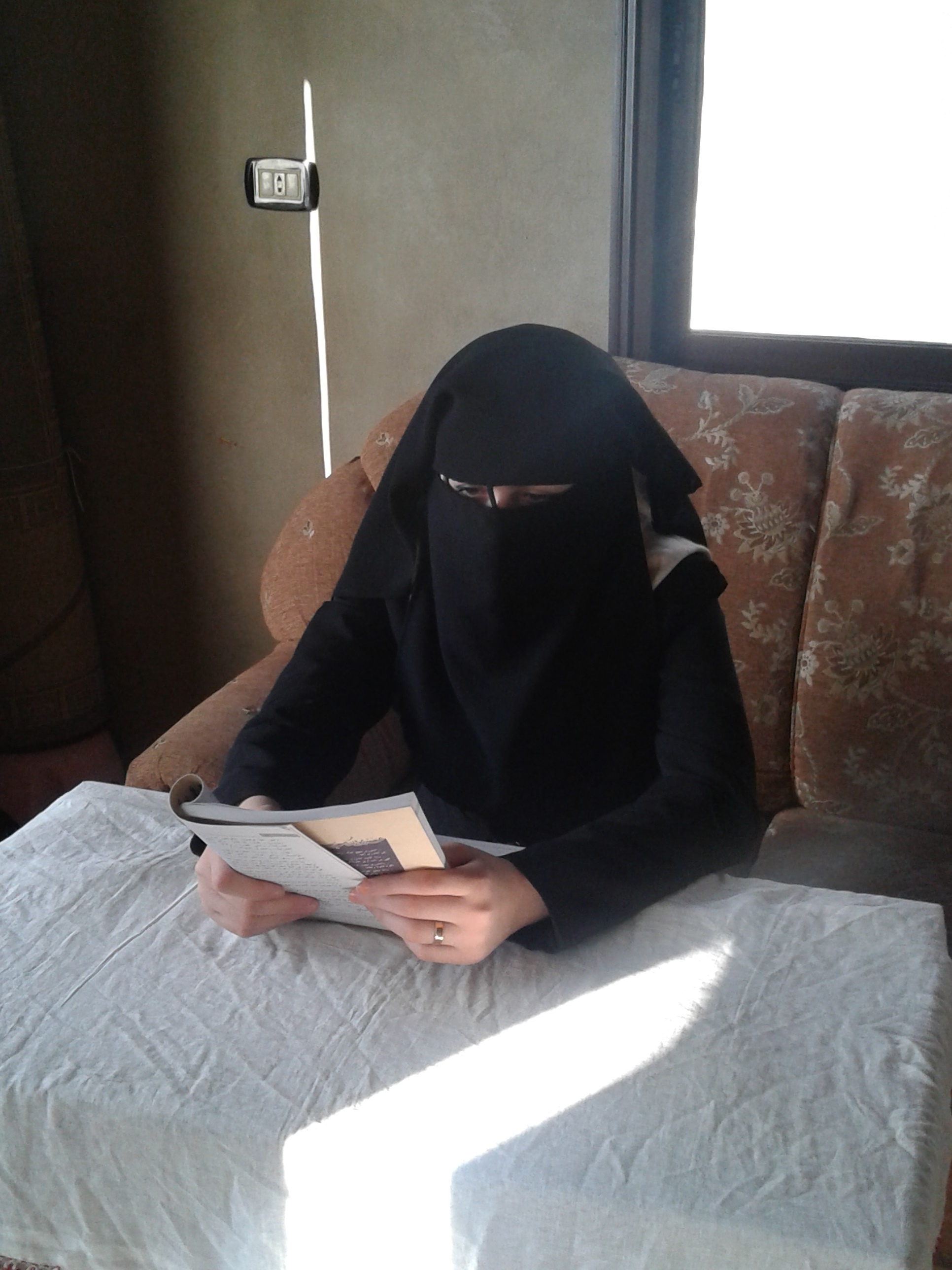Women Losing Their Hard-Won Freedoms

A woman wearing a niqab in Kafr Nabl. Photo: Maha Al-Ahmad
Safaa was just 15 when she took her own life. Married off against her will, the girl poisoned herself eight months after her wedding.
Safaa’s aunt Rahma, 50, said, “My niece was not happy with her husband and she did not love him. She often complained about him because his face was distorted due to old burn scars…but her relatives put pressure on her so she agreed to marry him and so this led to such a sad ending.”
Women in Kafr Nabel say that their personal freedoms have been under attack ever since the beginning of the revolution. As well as the growing power of stricter interpretations of Islam, families were more cautious about allowing female members to make their own decisions.
The situation is a throwback to more conservative times, explained Um Muhammad, 70.
“In the past, when I was young, a woman was controlled by the wishes of her husband, her father and the other men who had authority over her,” she said. “For example, a girl’s father could to force her to marry her cousin and he wouldn’t care about her opinion, even though the law guarantees her the right to choose. Over time, these customs and traditions decreased and became more rare.”
Um Muhammad agreed that such cases were now on the rise, with parents once again forcing their daughters to abide by their decisions due to harsh conditions that meant young women were more vulnerable to assault or harassment.
That was the experience of 19-year-old Reem, who wanted to continue her studies after gaining her high school diploma.
However, her father refused to allow her to attend the regime-controlled university of Aleppo for fear she might be arrested, as had happened to many other female students.
“I have repeatedly tried to convince my father to let me go to college, but it was pointless,” Reem said.
Reem’s father, 65, said that before the revolution, the situation in Syria had been secure and young women were allowed a larger degree of personal freedom.
Now the increased chaos, including the influx of foreign fighters into the country, made life much more precarious.
Some argue that more conservative men have used the precarious security situation to enforce their own selfish demands.
Iman, a 30 year-old from Kafr Nabl, began wearing a khimar – a black head and face covering – about a year ago. Although she is not convinced that she needs to cover up to this extent, she said that her husband had requested it.
This style of dress has become more common since the revolution, and Iman said she believed that her husband, a jealous man, had taken advantage of the spread of this phenomenon to put pressure on her.
He had also refused her other requests, including the chance to work outside the home.
Islamic experts insist that Sharia law only serves to benefit women and the wider society.
Sheikh Muhammad, a 75 year-old cleric from Kafr Nabl, said, “Islam does not forbid anything unless this serves a beneficial purpose. For example, when it forbids women from having illicit relationships, committing adultery, going on unaccompanied journeys, applying makeup, showing themselves to someone other than their husband or having corrupted morals, it was in order to protect them from the risk of abuse and assault.
“And this also preserves society because illegal relations cause family breakups and increase the proportion of homeless children, as is well known. Islam permits many things for women that do not directly harm them or the community, such as divorce if no other solution can be found and also the right to remarry after losing a spouse or if he is absent for a long time with no news of his fate.”
Indeed Rakia, 27, from Ihsim in northern Kafr Nabl, approached Sheikh Muhammadafter her husband had been in prison for four years.
The mother-of-two said, “According to my request, Sheikh Muhammad proceeded with the divorce in absentia. Islamic law states that a woman can divorce her husband in absentia if he is absent for more than four years.”
Rakia went on to marry a young man she met at work.
Sheikh Muhammad continued, “Most women in our community respect Islamic laws which restricts personal freedom to some extent because they are convinced that it is to their personal advantage. There are rare cases of women who do not respect Islamic law, which often leads them to a bad end and society which looks down on them.”
Others argue that there was nothing Islamic about restricting women’s personal autonomy.
Fatima holds a college degree and works as a teacher, with plans to open her own private school. The married mother-of-three says that she has complete control over the decisions she made in her own life and argued that when women had more freedom they can contribute more to society.
Fatima’s colleague Rasha agreed.
“Some groups have recently called for us all to wear a khimar, but I was one of the women who were not convinced that it was right to wear it so I didn’t, despite the insistence of my brother Ali. I only wore traditional Islamic costume which covers the body and the head. I did not care about my brother’s opinion and I did what suited me.
Rasha continued, “I am ready to resist to the very end for the sake of my personal freedom, as long as I am convinced of what I do within the limits of the Islamic law and the religion I cherish.”
You can read the Arabic version of this article here.
